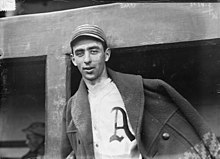Jack Barry (baseball)
| Jack Barry | |
|---|---|
 Jack Barry in 1913. | |
| Shortstop/Second baseman | |
| Born: April 26, 1887 Meriden, Connecticut | |
| Died: April 23, 1961 (aged 73) Shrewsbury, Massachusetts | |
Batted: Right Threw: Right | |
| MLB debut | |
| July 13, 1908, for the Philadelphia Athletics | |
| Last MLB appearance | |
| June 23, 1919, for the Boston Red Sox | |
| MLB statistics | |
| Batting average | .243 |
| Stolen bases | 153 |
| Runs | 532 |
| Teams | |
| As Player
As Manager | |
| Career highlights and awards | |
John Joseph "Jack" Barry (April 26, 1887 – April 23, 1961) was an American shortstop, second baseman, and manager in Major League Baseball, and later a college baseball coach. From 1908 through 1919, Barry played for the Philadelphia Athletics (1908–15) and Boston Red Sox (1915–19).
Career
Born in Meriden, Connecticut, Barry spent his nearly entire tenure in the big leagues on winning teams, first the Philadelphia Athletics and later the Boston Red Sox. Athletics manager Connie Mack signed Barry off the campus of the College of the Holy Cross to play shortstop on what would become his famous $100,000 infield. The unit, one of the most famous groups of teammates in baseball history, consisted of first baseman Stuffy McInnis, second baseman Eddie Collins, and third baseman Frank Baker. The group, which represented an enormous financial investment at the time, was critical to the Athletics winning the American League pennant in 1910, 1911, 1913 and 1914, and World Championships in 1910, 1911, and 1913.
In 1915, the year after the Boston Braves swept the Athletics in the World Series, Red Sox owner Joe Lannin paid $8,000 for Barry's services, as Mack was dismantling the team. Upon joining the Red Sox, he hit just .262 but played reliable defense at shortstop, proving to be the last piece of the puzzle in what was to be another pennant-winning team. He played in the World Series in 1915 and 1916 for the Red Sox. Acknowledged as the team's on-field leader, he became a player-manager in 1917, leading the team to a 90-win season and a second-place finish to the Chicago White Sox. In the war year of 1917, manager Jack Barry chose to enlist and on October 18, 1917 Jack and four other Red Sox players, who had enlisted as yeomen in the naval reserve, were called to active duty and ordered to report for duty on November 3, 1917. He served all of 1918 in the military. After poor play in 1919, he decided to retire rather than be sold away in another fire sale following Harry Frazee's decision to sell his shortstop back to the Athletics.
In an 11-season career, Barry posted a .243 batting average with 10 home runs and 429 RBI in 1223 games.
Barry became the head coach at Holy Cross in 1921, and continued in that position for 40 years until his death in Shrewsbury, Massachusetts at age 73. During his tenure, he posted the highest career winning percentage (.806) in collegiate history, and won the 1952 College World Series. He was among the initial class of inductees to the American Baseball Coaches Association Hall of Fame in 1966. In 2007 he was an inaugural veteran inductee of the College Baseball Hall of Fame along with Lou Gehrig, Christy Mathewson, and Joe Sewell.[1]
See also
References
- ^ "2007 College Baseball Hall of Fame Inductees". College Baseball Hall of Fame. Retrieved 2014-03-22.
External links
- Career statistics and player information from Baseball Reference
- Baseball Library
- 1887 births
- 1961 deaths
- Holy Cross Crusaders baseball players
- Boston Red Sox managers
- Boston Red Sox players
- Holy Cross Crusaders baseball coaches
- Baseball players from Connecticut
- Major League Baseball shortstops
- Philadelphia Athletics players
- People from Meriden, Connecticut
- People from Shrewsbury, Massachusetts
- Major League Baseball player-managers
- College Baseball Hall of Fame inductees
